Restorative Free Will
Restorative Free Will
Back to the Biological Base
Bruce N. Waller
Lexington Books
Lanham Boulder New York London
Published by Lexington Books
An imprint of The Rowman & Littlefield Publishing Group, Inc.
4501 Forbes Boulevard, Suite 200, Lanham, Maryland 20706
www.rowman.com
Unit A, Whitacre Mews, 26-34 Stannary Street, London SE11 4AB
Copyright 2015 by Lexington Books
All rights reserved . No part of this book may be reproduced in any form or by any electronic or mechanical means, including information storage and retrieval systems, without written permission from the publisher, except by a reviewer who may quote passages in a review.
British Library Cataloguing in Publication Information Available
Library of Congress Control Number: 2015949521
ISBN: 978-1-4985-2238-0 (cloth : alk. paper)
eISBN: 978-1-4985-2239-7
 The paper used in this publication meets the minimum requirements of American National Standard for Information SciencesPermanence of Paper for Printed Library Materials, ANSI/NISO Z39.48-1992.
The paper used in this publication meets the minimum requirements of American National Standard for Information SciencesPermanence of Paper for Printed Library Materials, ANSI/NISO Z39.48-1992.
Printed in the United States of America
Contents
Restorative free will is a new way of looking at free will, but in some respects it is a very old view of free will: some of the free will pieces that the account fits together have been observed and celebrated and elaborated for centuries. But rather than viewing these elements as competitors, restorative free will attempts to show how they function togetherand serve vital symbiotic functionswhen free will is viewed as an important capacity of complex biological organisms such as humans but also other species. Trying to understand the functioning of the heart in isolation from the rest of the organism, or as if the heart must be the defining essence of the organism, is not a promising path to understanding how the heart functions. The same applies if we attempt to understand the need for open alternatives, or the need for control, or the need for reflection, as if these are the defining features of free will, such that free will can be explained by exclusive reference to that essential element. The major accounts of free will have provided great insights; but those insights have been treated as competitors, rather than as mutually supportive elements of the free will of human animals. Rather than seeking the essential element of free will, a better approach is to examine the full range of essential elements of a well-functioning free will in organisms similar to ourselves, and how those elements work together for the benefit of the organism. Furthermore, studying the human heart under the assumption that hearts are the exclusive property of humans is not a promising method of understanding how the heart functions; the same rule applies to treating free will as a uniquely human capacity.
Discoveringwhat I take to bethe combined symbiotic elements of free will was not the result of any brilliant insight or deeper inquiry or clearer perspective. To the contrary, those discoveries were all but forced upon me, while I struggled vigorously but unsuccessfully to avoid seeing them. They were discoveries that happened in the course of a very different quest: a quest aimed at destruction. My goal was to destroy moral responsibility, drive a stake in its heart, and bury it at the crossroads; and I was quite willing to destroy the free will accountsnothing better than accomplices, in my viewthat were providing aid and comfort to moral responsibility. This destructive quest resulted in discoveries I had not anticipated: the arguments in favor of moral responsibility still seem fatally flawed; but the accompanying accounts of free willwhile they fail to establish claims of moral responsibilitycontain rich insights into the nature of free will, which I could not avoid appreciating even when my goal was to attack them. When they are liberated from the impossible task of supporting moral responsibility, those insights can be better appreciated: rather than competing accounts of moral responsibility they are essential and harmonious elements of animal free will.
The goal of this book is not only to show that free will can survive the demise of moral responsibility; rather, to show that our understanding of free will can flourish and expand and deepen when it is freed from the dead weight of moral responsibility, and our understanding of free will can be enhanced by remarkable studies in psychology, neuropsychology, biology, primatology, sociology, and anthropology. We do not lose free will when moral responsibility is rejected; to the contrary, we gain a better understanding and appreciation of free will, as well as better understanding of ways to enhance and enrich and protect free will.
This is not an argument against moral responsibility. I believe that moral responsibility cannot survive in a world without miracles, and that our natural world is devoid of any plausible niche that will support moral responsibility. Most contemporary philosophers are compatibilists, who insist that moral responsibility can survive and flourish in a purely natural, even deterministic, environment. But moral responsibility is not the focus of this book. I have spent many years developing the best arguments I could muster against moral responsibility (Waller 1990, 2011, 2015) in the fervent hope of destroying moral responsibility, root and branch. Many others (such as Derk Pereboom, Galen Strawson, Neil Levy, Thomas Nadelhoffer, and Gregg Caruso) have been allies in that effort. But whether the walls of moral responsibility are broken or standing, the question here is not moral responsibility, but the nature of free will. Given the long history of philosophical efforts to link free will and moral responsibility, it will not be possible to leave moral responsibility entirely out of the discussion. (And given my obsession with destroying moral responsibility, I doubt that I could manage to leave it out of the discussion in any case.) But my hope is that even those who are fervent supporters of moral responsibility will find some part of the restorative free will account appealing. It would be surprising if they do not, since restorative free will embraces insights from compatibilists and libertarians who are dedicated champions of moral responsibility; and not only embraces them, but incorporates them, and claims that they are allies rather than adversaries.
In the years that I have been writing about free will and moral responsibility, the most frequent target of my arguments has been the work of Daniel Dennett. In one way, that seems strange, since Dennett is among the philosophers whose work I most admire; and Dennetts work on the importance of controltogether with his seamless integration of empirical studies with philosophical investigationhas had an enormous influence on my own approach to issues of free will and moral responsibility. In another sense, it is not surprising: Dennett has developed a variety of the strongest and clearest and most creative arguments for moral responsibility, and anyone who seriously questions the legitimacy of moral responsibility must carefully address those powerful arguments. But while I have often criticized Dennetts views, I trust it is clear that I regard his work on free will and on the importance of control as profoundly insightful, and that Dennett is a philosopher to whom I am deeply indebted.
Other major targets of my argumentative efforts include Harry Frankfurt, Susan Wolf, and John Martin Fischer. Again, their arguments concerning moral responsibility are targeted because I take them very seriously: they rank among the strongest advocates of moral responsibility, and anyone who denies moral responsibility must endeavor to deal with their powerful arguments. But I hope that it is clear that I believe that not only have they made rich contributions to the debate concerning free will and moral responsibility, but also that they have enriched our understanding of some of the vital elements of free will.
Next page
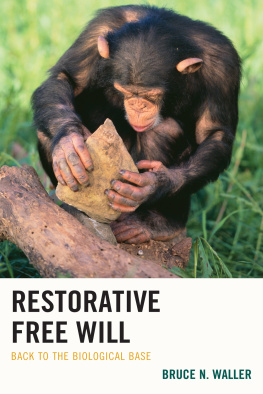

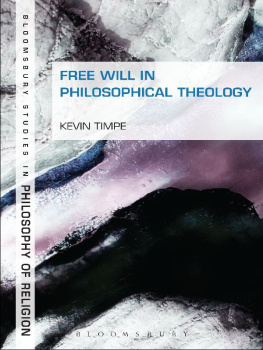
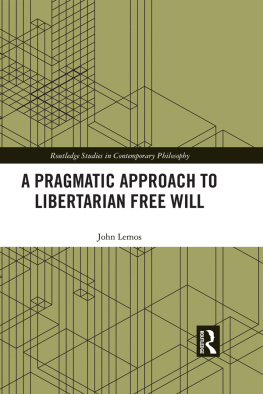

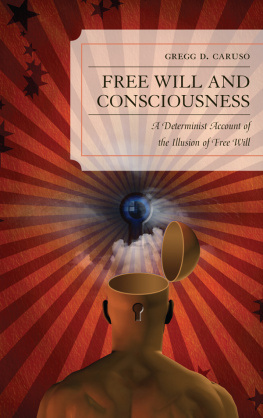
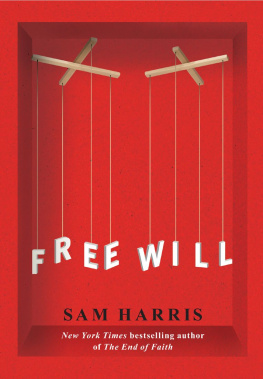





 The paper used in this publication meets the minimum requirements of American National Standard for Information SciencesPermanence of Paper for Printed Library Materials, ANSI/NISO Z39.48-1992.
The paper used in this publication meets the minimum requirements of American National Standard for Information SciencesPermanence of Paper for Printed Library Materials, ANSI/NISO Z39.48-1992.